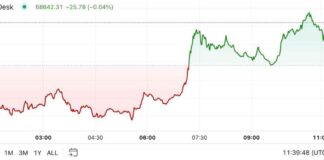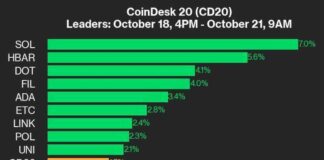PayPal and Venmo have recently announced their support for Ethereum Name Service (ENS) domain names, making cryptocurrency transactions easier and more user-friendly for their customers. This integration allows users to utilize recognizable ENS names instead of complex wallet addresses, streamlining the process of sending and receiving digital assets.
The decision to incorporate ENS into their platforms is a strategic move by PayPal and Venmo to enhance the user experience within the crypto space. Traditionally, cryptocurrency transactions involved inputting long, alphanumeric wallet addresses, which often led to errors and confusion. By linking wallet addresses to ENS domain names ending in “.eth,” users can now conduct transactions simply by entering a familiar name, reducing friction and minimizing the risk of mistakes.
Khori Whittaker, Executive Director of ENS Labs, expressed enthusiasm for the partnership, highlighting the benefits of bringing ENS naming capabilities directly to millions of users through Venmo, PayPal Mobile, and PayPal Web. This integration not only simplifies wallet address management but also aims to increase the efficiency and security of crypto payments.
ENS, which has been operational since 2017, has witnessed significant growth, registering over 4 million domain names. This indicates a rising demand for user-friendly solutions in the web3 ecosystem, as individuals seek more intuitive ways to engage with digital assets. The integration of ENS by PayPal and Venmo reflects a broader trend towards making cryptocurrency transactions more accessible and convenient for a wider audience.
PayPal’s foray into the web3 space began in 2020 when it started offering users the ability to buy, hold, and sell cryptocurrencies like Bitcoin, Ethereum, and Litecoin. This service was made possible through a partnership with Paxos Trust Company, a regulated provider of cryptocurrency services. Venmo followed suit in 2021, providing its users with similar features to engage with digital assets seamlessly.
In addition to the ENS integration, PayPal introduced its stablecoin, PayPal USD (PYUSD), in collaboration with Paxos in August 2023. Initially launched on the Ethereum blockchain, PYUSD was later expanded to the Solana network in May 2024, allowing users to transact across different blockchain platforms. The stablecoin is backed by US dollar deposits and short-term US Treasuries, maintaining a 1:1 ratio with the US dollar to ensure stability and reliability.
Despite an initial surge in market cap exceeding $1 billion on August 24, PYUSD has faced challenges in recent months. As of early September, the stablecoin’s market cap experienced a 17% decline, with the majority of the decrease occurring on Solana. The market cap of PYUSD on Solana dropped by 21.5% to $507.5 million, while its Ethereum deployment remained relatively stable, decreasing by only 3% to $351.8 million.
This decline in market cap comes amidst PayPal’s efforts to establish PYUSD as a reputable stablecoin in the market. Despite the challenges faced by PYUSD, the integration of ENS by PayPal and Venmo underscores the companies’ commitment to enhancing the user experience and promoting the adoption of digital assets among a broader audience.
In conclusion, the integration of Ethereum Name Service domain names by PayPal and Venmo represents a significant milestone in simplifying cryptocurrency transactions and making them more accessible to users. By leveraging ENS technology, users can now conduct transactions using familiar names, eliminating the need for cumbersome wallet addresses. This move aligns with PayPal’s broader push into the web3 space and its ongoing efforts to expand its crypto offerings, despite challenges faced by its stablecoin, PYUSD. As digital assets continue to gain mainstream acceptance, initiatives like the ENS integration demonstrate a commitment to innovation and user-centric solutions in the evolving landscape of cryptocurrency.

















